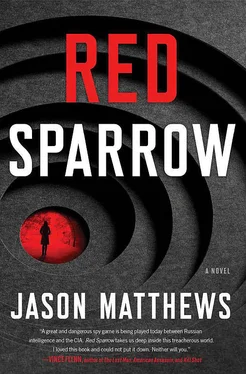Back in Alice’s office, the CID link was cathode-tube-archaic and the names inched down. Security-clearance databases, employee roles, US Navy active duty and contractor rosters. Alice’s mannish finger ran down the screen; nope, nope, longer than seven years, less than three, nope. Senior management at Electric Boat and General Dynamics, of course not. Alice was fast, she looked at a name, scanned the info, and moved on. She had been pulling at names on lists for three decades. They had two piles of papers and Nate stopped arguing about “possibles” because Alice was so fast. She had her “first string,” her Lovely Eleven, she called them, and started going through the holies: employment, salary, taxes, residence, phone, Internet, vehicle, banking, mail, marriage, education, children, arrests, divorces, travel, parents, ethernet or cable, straight or gay. “How well did you prepare our little illegal? How far back did you go? As far as me?” whispered Alice to the screen.
Three days later, Nate and Alice brought Benford the list, and he tapped the end of his pencil on each name as he glanced at the profiles, tap, tap, tap, and tossed the pencil aside and handed Nate the paper. “It’s Jennifer Santini,” Benford said with a yawn, the casual savant with unruly hair. Alice nudged Nate— See, I told you —and cackled.
“Let’s do a deep dive, but I’m sure she’s our boy,” said Benford. He looked at Nate. “Now we go to New London and look around.”
SOPHIE’S VINAIGRETTE
Combine puréed garlic, dill weed, dried oregano, dried pepper flakes, Dijon mustard, sugar, salt, pepper, and grated Parmesan cheese with one part balsamic vinegar and three parts extra virgin kalamata olive oil and emulsify.
Despite the splendidsummer weather, New London was drab and depressed, past its commercial and cultural prime (which had concluded when the whaling fleets disappeared in the 1860s). The once-teeming Thames River waterfront, which during World War II had seen gray hulls rafted three-deep, a forest of masts and antennae and funnels rocking gently on the tide, was now a brackish moonscape of tilting, oil-soaked piers and rusted-out warehouses with collapsed roofs. Two- and three-story clapboard houses, mostly double-family units, covered the residential hills above the river. The black tarpaper roofs were separated by the width of two outstretched arms, clotheslines stretched between second-floor balconies. Waist-high chain-link fences and swingy gates pitted by the salt air marked tiny front yards and weedy back lots.
Across the river in Groton, the Electric Boat Shipyard stretched along miles of the riverbank, a city of cranes, steam plumes, and arching factory roofs. Occasionally visible from the seaward end of a massive floating dry dock, itself the size of a cruise ship, was the impossibly big cigar shape of a matte-black nuclear submarine, high and dry on blocks, its seven-bladed propeller shrouded in heavy plastic, hidden from Russian spy satellites.
Nate did not know what to expect. They took the train up—Benford did not drive—and they stood on the station platform like two Bulgarian swineherds in Sofia for the weekend, not mole hunters looking for a Center-trained illegal. It was not clear whether Benford was parsimonious or crazy or simply operationally deluded to insist, mystifyingly, that they share a turret room at the Queen Elizabeth Inn, a B&B in a creaky Victorian halfway up a leafy hill. And the constant walking—casing, he called it—five, six, twelve hours a day, during which the quirky, brilliant cockatoo talked to Nate about the OGPU and the NKVD and the Cambridge Five, a primer of Cold War history.
Day One: They worked up and down the hill, uphill in the morning, downhill in the late afternoon, looking at the houses, at the cars parked solid along the curb, the weeds coming up on the sidewalk, and the lace curtains in the front windows. They looked for likely signal sites, cache sites, nearby parks, the geography that could support an illegal. They had nothing.
Day Two: They walked past Santini’s house at different times to mark the positions of her window shades, to see if the empty geranium pot on the front steps was moved, which could be a safety signal. They were careful at night, walked by the darkened house only once, dim lamplight behind the shade of an upstairs room. Was she sitting in the dark, looking out at the street? Did she have another apartment, rented in alias, for meetings with her handler? They had nothing.
Day Three: They casually asked about her at the faded mom-and-pop store on the corner. No one knew her, no one cared. How the fuck we must look, Nate thought, this counterintelligence mystic and his young sidekick, and he tried a joke but Benford told him if he didn’t pay attention he’d send him home, and Nate said, “Pay attention to what?” while they were jerking off in New frigging London, Connecticut. They had nothing.
They were working on the margins; Benford was determined to keep this out of the gun-and-badge clutches of the FBI. “If she’s a Center-trained illegal, she’ll smell trouble long before anyone drives up to the front of the house. She’ll bolt ninety seconds after she sees or hears something she doesn’t like. It’s their training.” They had to do this solo.
Day Four: They did it all over again. That night, a summer thunderstorm rocked the trees and moved the shutters on the turret room, and the electricity went out and a battery radio played downstairs. Nate awoke to a flash of lightning and saw Benford in a chair sitting at the window, staring at the storm, seriously creepy. He was seeing the faces of the twelve Russian agents the CIA lost in one year, 1985, the Year of the Spy, all victims of Ames, and Hanssen, victims of inexplicable treachery that fed them all to the belching blast furnaces of the Soviet Union.
And meals with Benford were the real test, the challenge. It wasn’t just the bumper-car conversation, but also the lobster bibs and hot sauce and oyster crackers and rating the clam chowders—too creamy, too many potatoes, too brothy, not enough sand, you needed a minute amount of grit—and discussing the difference between cod and scrod and what did and did not belong in a New England boiled dinner. “No cloves. Ever. There are rules that cannot be violated,” said Benford the mole hunter.
With little of substance to go on, Benford on Thursday night over dinner announced that it was time to do an entry into Jennifer Santini’s house the next morning. “An entry?” said Nate across the table. They were dining at the Bulkeley House on Bank Street near the harbor. “Benford, what do you mean, ‘an entry’?”
Benford was sawing at an immense rare piece of prime rib, head turned sideways, the better to slice the flesh. Nate put down his knife and fork.
“Compose yourself,” said Benford, chewing. “By ‘entry’ I mean the extralegal breaking and entering into the private residence of a presumed innocent American citizen against whom there is no evidence of wrongdoing by two unauthorized officers of the Central Intelligence Agency who are, incidentally, currently engaged in an uncoordinated and thus illegal counterespionage investigation which in the domestic field is the purview of the Federal Bureau of Investigation as stipulated by Executive Order 12333.” He looked back down at his plate and slathered more creamed horseradish sauce onto his beef. “That’s what I mean,” he said, then added, “This horseradish sauce is excellent.”
=====
Day Five: A quiet Friday morning. They waited until ten and walked bareheaded and with empty hands through the little gate to the back of Santini’s two-story house. The windows of the houses across the street were empty. The backyard was unkempt. A rusted washtub lay upside down on the bare earth next to a tilting shack. Benford walked up the wooden steps and tried the back door. It was locked and he peered through the chintz curtains. No one home.
Читать дальше












